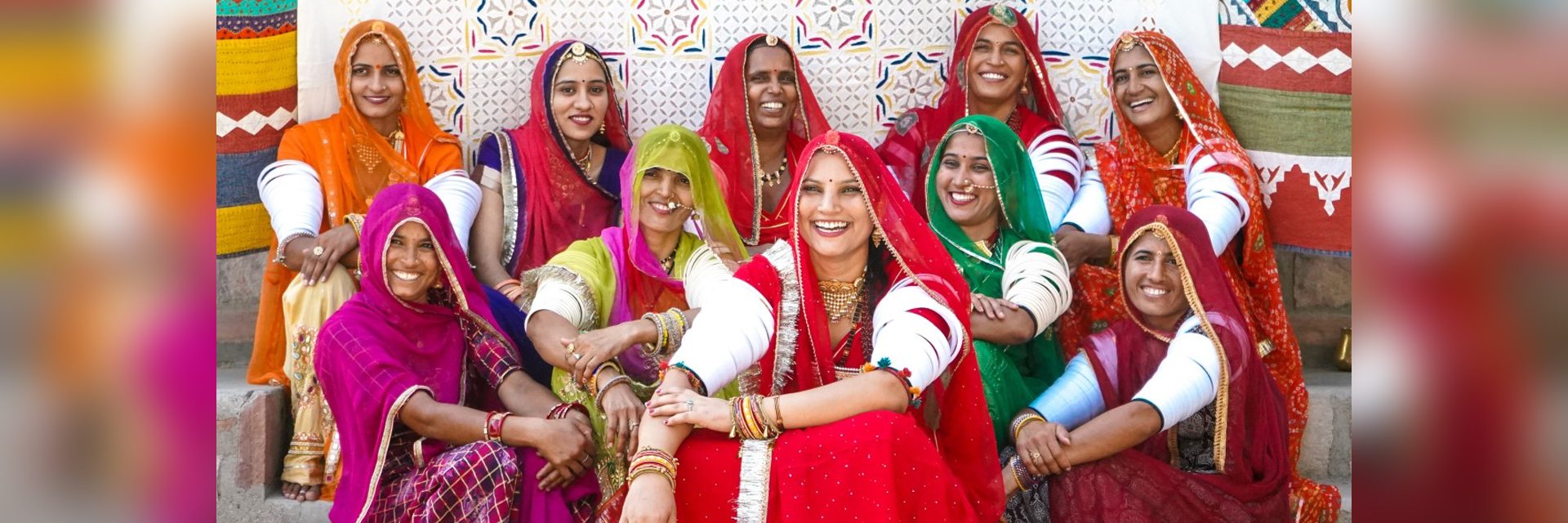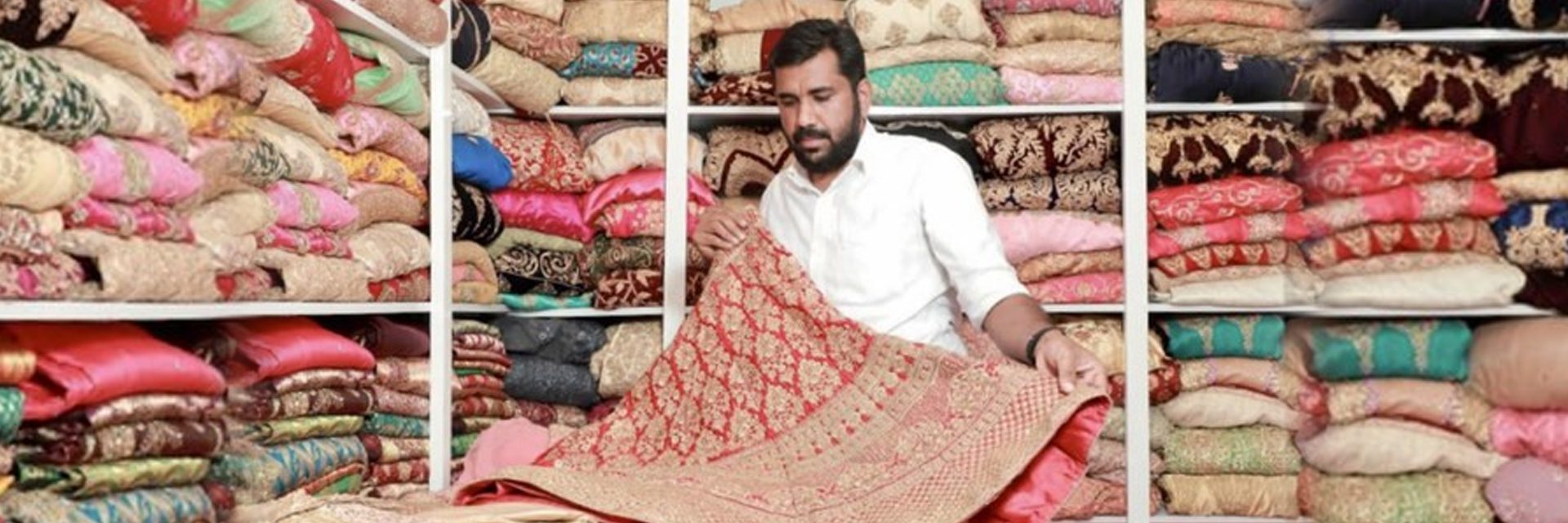(May 18, 2022) The term fashion world often brings to mind the image of well-known designers, supermodels, and ramp walks. But Ruma Devi is unlike any fashion designer, she is a superwoman for her peers. Responsible for single-handedly placing the handwoven designs of the artisans from Rajasthan on the global fashion map, the 33-year-old handicraft artisan, in the process, has empowered the lives of thousands of rural women from the Barmer region. From providing job opportunities in embroidery work to making local women participate in fashion shows across the world, Ruma has done everything.
A school dropout, Ruma is a national awardee, a TedEx speaker and already a towering personality when it comes to women empowerment. She was also honoured by Nari Shakti Puraskar in 2019.

Ruma Devi
Early life
Ruma was only four when her mother passed away and she spent most of her childhood at her grandmother’s house. “I used to see my grandmother doing embroidery work. In fact, almost every house in the Barmer district used to wear clothes with embroidery done by women of the house. I never thought that I’d do it one day, but learnt it anyway,” Ruma tells Global Indian.
Coming from a conservative rural family, Ruma dropped out of school at an early age and was married at 16. She didn’t even understand the responsibilities of her marriage when a tragedy struck. “I was lost and I was coming to terms with it when the most devastating thing happened. I lost my first child due to an illness. I didn’t have enough money to get my child the right treatment. It angered me so much and I went into depression,” recalls the handicraft artisan.

Still in her late teens, she knew she had a long life ahead, but the child’s face kept haunting her. “I couldn’t do anything and felt aimless. I decided to distract myself with something that could keep me occupied.” She had two options, either to work as a maid in someone’s house or take up embroidery and try her luck. “I decided to pick embroidery. I could do embroidery on bags that villagers carry when they visit their relatives. But I had no money to get the bags in the first place,” laughs Ruma. In 2008, she convinced a few women to come together and buy a sewing machine for stitching bags and do embroidery on them. “We bought a second-hand sewing machine and that’s how we started, she adds.
Few months into it, Ruma realised there wasn’t enough work. “After all, how many bags could we sell to the people in the village,” she says. That’s when the search for new customers began which brought them to Gramin Vikas Evam Chetna Sansthan (GVCS), an NGO that works for the upliftment of women in the region. “They gave us three days to finish an embroidery assignment and bring the bags to them. Everybody was so thrilled that we worked the entire night, and were done with our job by the next day,” laughs Ruma, for whom there was no looking back as she kept getting more work from the sansthan, which she would head a few years down the line!

Ruma Devi receives Nari Shakti Award from Ram Nath Kovind
The challenges along the way
While Ruma and her group of women were expanding to nearby villages and had become a big collective of talented artisans, voices of discouragement tried to dampen their spirit. Many women were not allowed to step out of their homes despite their success. But Ruma convinced them to work from their homes while those allowed to step out would do the marketing bit in districts outside Barmer. Soon people started liking their work and more work followed.
It was time to step out of Rajasthan, and a trade show in Delhi in 2011 was the perfect opportunity to do that. But the decision didn’t find much support from her family members as she was charting into an unknown territory. Ruma had butterflies, but she feared nothing. Although the business was not great, it helped her understand the market well. The next year brought with it ₹11 lakh, which was way beyond their expectation. This helped the women to believe in themselves and in the leadership of Ruma.

What began with Ruma is now 30,000 strong. Currently women do applique and various types of embroidery work on upholstery items and everyday clothes. “We have uplifted many families from poverty,” she beams with pride.
In 2010, Ruma took over as the president of GVCS and under her leadership, it has expanded operations to 75 villages and trained 11,000 artisans so far. The organisation is now collaborating with tribal women and taking it across India and to the world. The 32-year-old also collaboratively started sister producer company, Applique Handicrafts Producer Company for artisans.
The Fashion Diva
The ramp bug bit Ruma after she witnessed a fashion show in Jaipur a few years ago, and since her band of women were designing clothes too, she wanted to give it a try.

“Again, people within and outside said that our clothes were not made for the ramp and that we should stick to what we were doing. But since we had come this far, I saw no harm in trying something new,” says Ruma, adding, “I felt a fashion show would be a good platform to showcase our work yet I had no clue how to go about it. A few designers told me, ‘You are supposed to stitch and not just embroider. Stitching is not your thing’.” These hurtful remarks made Ruma more determined to participate. She wanted people to see the artisans who often remain voiceless and faceless in the glamourous world of fashion.
In 2016, Ruma and her team designed clothes for a fashion show at the Rajasthan Heritage Week, and they were an instant hit. Soon designers started making their way to Barmer to know more about their work and designs. Since then, she has not only worked with best in the Indian and global fashion circuit like Bibi Russell and Abraham & Thakore, she has also visited Germany, Singapore, Thailand, Sri Lanka, the US and UAE to promote the arts and craft. “Our designs are now sold in various parts of the world. We have also started shipping our line of home furnishing lines of products to USA, Dubai and UK,” reveals the handicraft artisan.
Memorable moments
Life has taught Ruma that the sky is the limit if one is determined to overcome obstacles. A school dropout, Ruma received an honorary PhD from Mahatma Jyoti Rao Phule University, Jaipur in 2020. In 2019, she made an appearance at Kaun Banega Crorepati, “I was very nervous that I would sit next to Amitabh Bachchan. But he was so warm and gentle that I felt very comfortable,” Ruma shares.

Ruma Devi with Amitabh Bachchan on the sets of Kaun Banega Crorepati
The very next year, she organised a crafts workshop at the Harvard University, wherein she was invited as a speaker for their 17th annual India Conference. But she procrastinated it for a bit as she was “shocked” by the invite and “ignored it for a few weeks.” Recalling the time, she says, “Firstly, I didn’t dare to reply to that mail. Secondly, it was an expensive trip to go to the USA.” But with the help of Bajaj Group, who sponsored her trip, she could do it.
Ruma might have been born in a small village in Rajasthan, but once she discovered the talent inside her, she never looked back. “I am a very ordinary woman who didn’t know about her purpose, but things happened, and I never lost faith in my ability or in the women who trusted me,” the handicraft artisan signs off.
- Follow Ruma Devi on Instagram
Also Read: A Model Life: How Ramji turns ISRO’s iconic spacecraft into detailed miniatures at Craftizan



